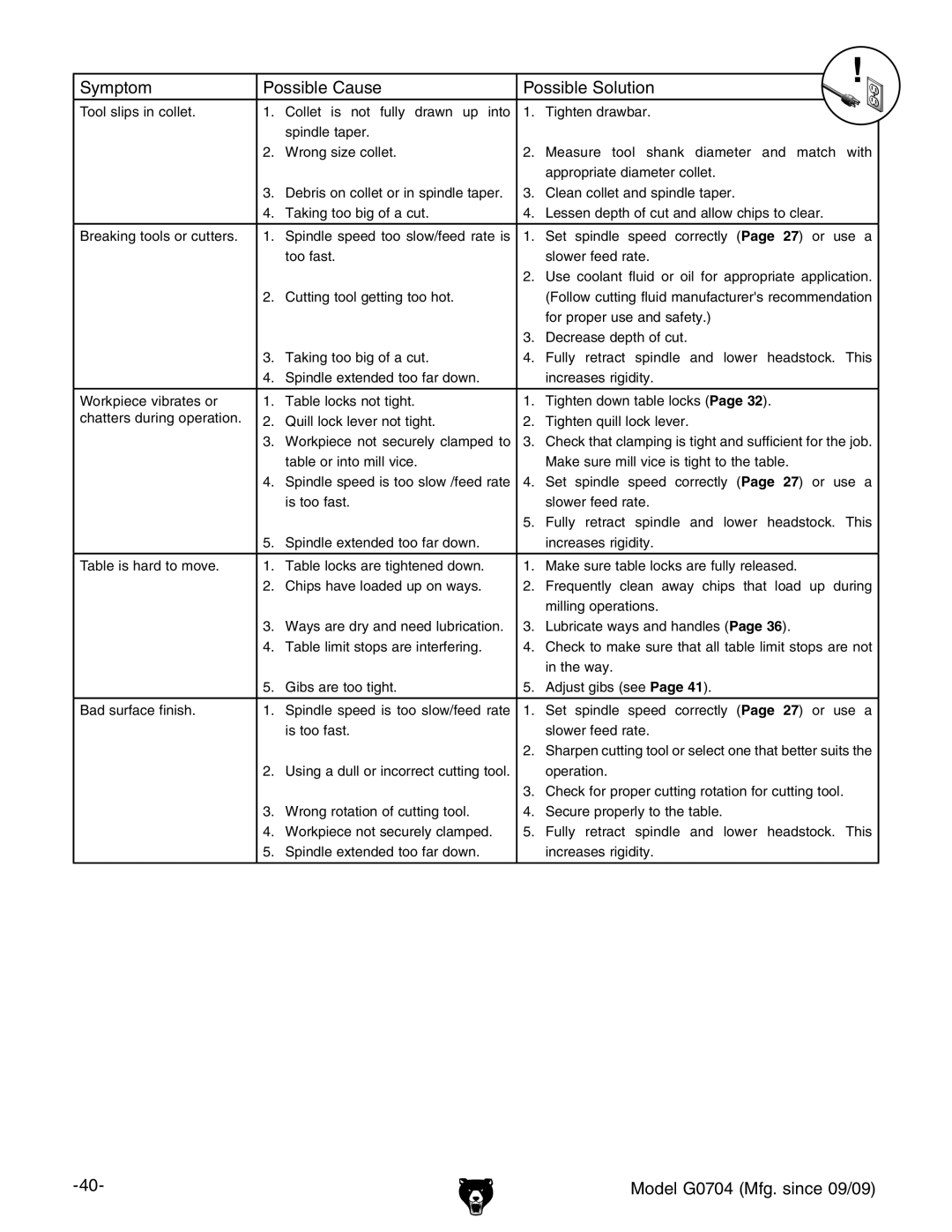
Symptom | Possible Cause | Possible Solution | ||
|
|
|
|
|
Tool slips in collet. | 1. | Collet is not fully drawn up into | 1. | Tighten drawbar. |
|
| spindle taper. |
|
|
| 2. | Wrong size collet. | 2. | Measure tool shank diameter and match with |
|
|
|
| appropriate diameter collet. |
| 3. | Debris on collet or in spindle taper. | 3. | Clean collet and spindle taper. |
| 4. | Taking too big of a cut. | 4. | Lessen depth of cut and allow chips to clear. |
|
|
|
|
|
Breaking tools or cutters. | 1. | Spindle speed too slow/feed rate is | 1. | Set spindle speed correctly (Page 27) or use a |
|
| too fast. |
| slower feed rate. |
|
|
| 2. | Use coolant fluid or oil for appropriate application. |
| 2. | Cutting tool getting too hot. |
| (Follow cutting fluid manufacturer's recommendation |
|
|
|
| for proper use and safety.) |
|
|
| 3. | Decrease depth of cut. |
| 3. | Taking too big of a cut. | 4. | Fully retract spindle and lower headstock. This |
| 4. | Spindle extended too far down. |
| increases rigidity. |
|
|
|
|
|
Workpiece vibrates or | 1. | Table locks not tight. | 1. | Tighten down table locks (Page 32). |
chatters during operation. | 2. | Quill lock lever not tight. | 2. | Tighten quill lock lever. |
| 3. | Workpiece not securely clamped to | 3. | Check that clamping is tight and sufficient for the job. |
|
| table or into mill vice. |
| Make sure mill vice is tight to the table. |
| 4. | Spindle speed is too slow /feed rate | 4. | Set spindle speed correctly (Page 27) or use a |
|
| is too fast. |
| slower feed rate. |
|
|
| 5. | Fully retract spindle and lower headstock. This |
| 5. | Spindle extended too far down. |
| increases rigidity. |
|
|
|
|
|
Table is hard to move. | 1. | Table locks are tightened down. | 1. | Make sure table locks are fully released. |
| 2. | Chips have loaded up on ways. | 2. | Frequently clean away chips that load up during |
|
|
|
| milling operations. |
| 3. | Ways are dry and need lubrication. | 3. | Lubricate ways and handles (Page 36). |
| 4. | Table limit stops are interfering. | 4. | Check to make sure that all table limit stops are not |
|
|
|
| in the way. |
| 5. | Gibs are too tight. | 5. | Adjust gibs (see Page 41). |
|
|
|
|
|
Bad surface finish. | 1. | Spindle speed is too slow/feed rate | 1. | Set spindle speed correctly (Page 27) or use a |
|
| is too fast. |
| slower feed rate. |
|
|
| 2. | Sharpen cutting tool or select one that better suits the |
| 2. | Using a dull or incorrect cutting tool. |
| operation. |
|
|
| 3. | Check for proper cutting rotation for cutting tool. |
| 3. | Wrong rotation of cutting tool. | 4. | Secure properly to the table. |
| 4. | Workpiece not securely clamped. | 5. | Fully retract spindle and lower headstock. This |
| 5. | Spindle extended too far down. |
| increases rigidity. |
|
|
|
|
|
Model G0704 (Mfg. since 09/09) |
